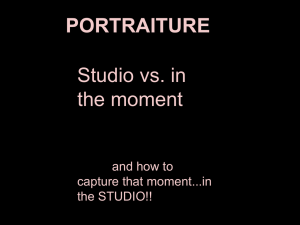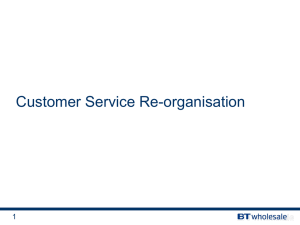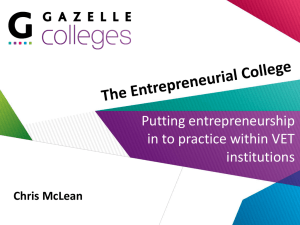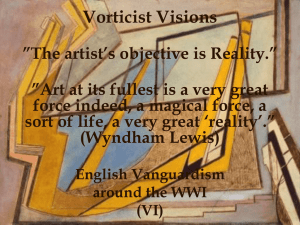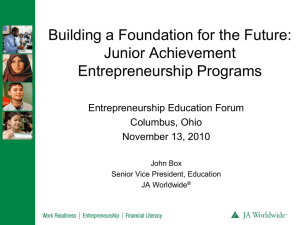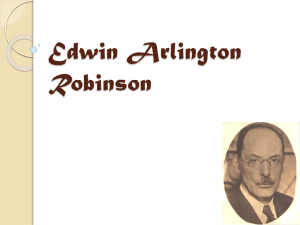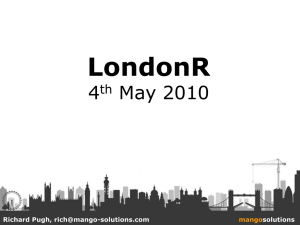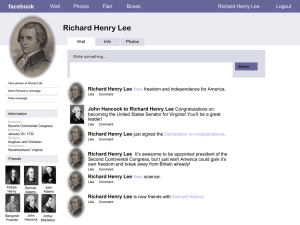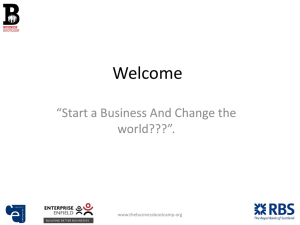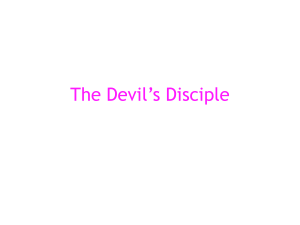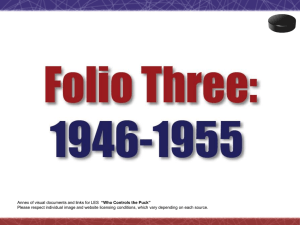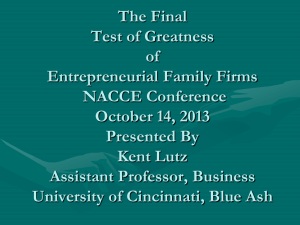ISBE conference presentation
advertisement
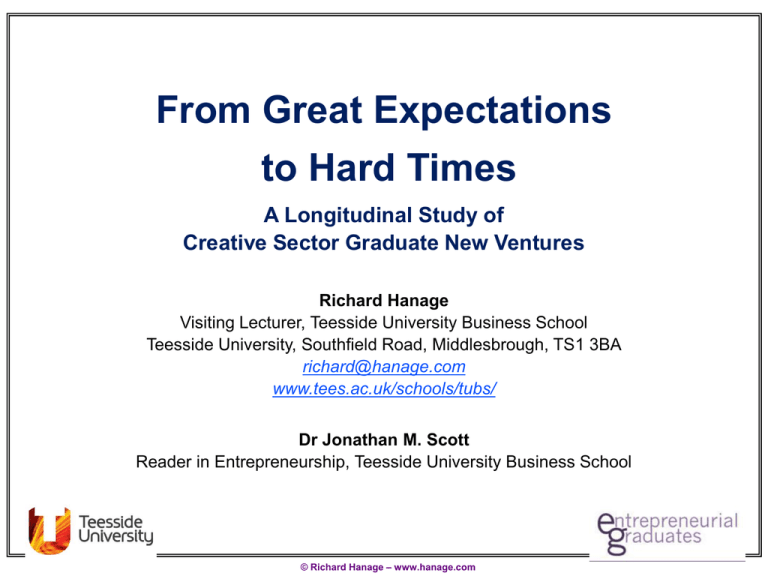
From Great Expectations to Hard Times A Longitudinal Study of Creative Sector Graduate New Ventures Richard Hanage Visiting Lecturer, Teesside University Business School Teesside University, Southfield Road, Middlesbrough, TS1 3BA richard@hanage.com www.tees.ac.uk/schools/tubs/ Dr Jonathan M. Scott Reader in Entrepreneurship, Teesside University Business School © Richard Hanage – www.hanage.com Research Question and Approach What happens to graduates with a creative degree when they try to start a digital creative business on graduating. Four year longitudinal study of 7 graduates, through 6-monthly in-depth semistructured interviews and periodic questionnaires (eg GET test, Learning Styles) A ‘convenience sample’ from my start-up workshops. All had been independently assessed as having ‘promise of business success’, but were young and lacked business experience. They had high levels of start-up support, eg DigitalCity Fellowships Interviews recorded, videoed, transcribed, and analysed by topic. Also used business plans, tweets, Facebook, for some minor triangulation. No other contact. Researcher tried to be a ‘disinterested observer’, but inevitably influenced the participants’ thoughts and actions, through the questions asked. © Richard Hanage – www.hanage.com Creative Graduates: Stages of Business/Career Development Prior creative experience Prior personal experiences school, Uni. Peer & family influences, etc. Prior enterprise/ work experience Phase 1: Life up to graduation and intent to start a business. Utilising ‘creative’ experience Their personal world and experience Utilising business experience Transition 1: from creative student to creative entrepreneur. Creative development Personal development: learning, shifts in expectations, skills, identity, career etc Entrepreneurial development Phase 2: Trying to be a successful creative entrepreneur. © Richard Hanage – www.hanage.com Utilising creative learning Personal learning and events Utilising business learning Transition 2: to a viable career in line with new personal objectives. Creative development (if any) Personal development in new role(s) Entrepreneurial / employee development Phase 3: Sustaining a successful (entrepreneurial?) career. Business/Career Routes Growth Business Owner Solo Freelancer Employee E: Animation business Practice their art A: Website design A: Website design F: Motion graphics F: Motion graphics A: Web-site designer C: Music design Use their art C: Music publishing & record labels C: Collate DJ music reviews B: Designer goods E-commerce B: Running creative workshops D: Animation sales Abandon their art B: E-marketing Manager D: Graphic design G: Retail ecommerce idea F: Betting Shop Mgr C: Shelf-stacker G: Sales lead generator idea D: Signage Manager G: Trainee chocolatier © Richard Hanage – www.hanage.com £20k+ £10-20k £5-10K £0-5k £0k Annual income Varied Journeys Shelfstacker job. Web-site design job. E-commerce marketing manager job. Record labels Freelance work Other ideas Other projects Web-site design business Freelance work in schools Music for computer games E-commerce website for designer products A: Linear B: Serial © Richard Hanage – www.hanage.com Music publishing DJing C: Portfolio Business Thread – Financially, they all ‘failed’. None have paid themselves the minimum wage. – Starting a business did not necessarily equate with being entrepreneurial. Some were avoiding boring jobs (2) or could not get a creative sector job (4). – Selling skills were the main missing element of human capital. They all struggled to find customers, despite having good products. – Support cost about £20k each. Some thought it was too optimistic and generous. – Unknown unknowns: So much to discover and learn. – Time commitment: only one worked consistently more than a 40hr week. – Alternative income from family, state or other work reduced the pressure to succeed in the business. – A business team may be a key to success (1), but not if the team is too big (1), or combines social as well as business (1). – Tough industry. Are some sub-sectors especially tough – eg music? © Richard Hanage – www.hanage.com Personal/Creative Threads Personal Thread – School/Uni behaviours were good indicators of business behaviours. – Artist/Business identities. Most moved easily from an artistic identity to more of a business identity – as expected from their declared intent. – Developing their personal lives. All were exploring options in their personal lives, which influenced their businesses – eg forming/splitting social partnerships. – Personal issues were major determinants of career outcomes – eg financial pressures on acquiring a family, having to move location, loss of alternative income. – Learning: all believe that the experience was not wasted. – Serial Entrepreneurs? None of the six in employment expect to run a full-time business again, but some may do some freelance work Creative Thread – Practitioners? Three were very keen to continue as practicing creatives. Another three do it as a side-line or hobby. © Richard Hanage – www.hanage.com Questions Arising from Insights – Excess graduates. Do Universities produce too many creative graduates? – Enterprise training. Do too few creative students get in-depth business experience and training? Especially about being ‘necessity entrepreneurs’. – Masters degrees. Do graduates do a Masters degree mainly to postpone the pain of entering the employment market? – Post-grad support. Are graduate start-up schemes too optimistic and too munificent? – Selling skills. Do start-up schemes give too little training in selling? – Teams. Should start-up programmes encourage team start-ups? – Getting experience. Is starting a graduate business a necessary step on the road to a ‘proper creative sector job’ rather than the first step in entrepreneurship? – Assessments & prior experience: are they good indicators of business success? – Personal weaknesses (eg confidence): how can we make sure we address these? © Richard Hanage – www.hanage.com Next Steps: Focus on the Entrepreneur This is a very unusual longitudinal data-set: detailed real-time data from business birth to closure (and beyond). What other issues should be investigated? Business stage Entrepreneurial issues Why and how did they start the business? • • • • Prior experiences Entrepreneurial intent Stages of start-up Use of business support How did they run the business? • • • • Critical incidents Entrepreneurial learning Networking/stakeholders Marketing/selling Why and how did they close it? • • • Impending doom Closure and grief Learning from failure What next? Why? • • Next career step Return to entrepreneurship? © Richard Hanage – www.hanage.com
![[Name of Business]](http://s2.studylib.net/store/data/005439490_1-eb485795b6ab94ac46e88cc0426770e1-300x300.png)

